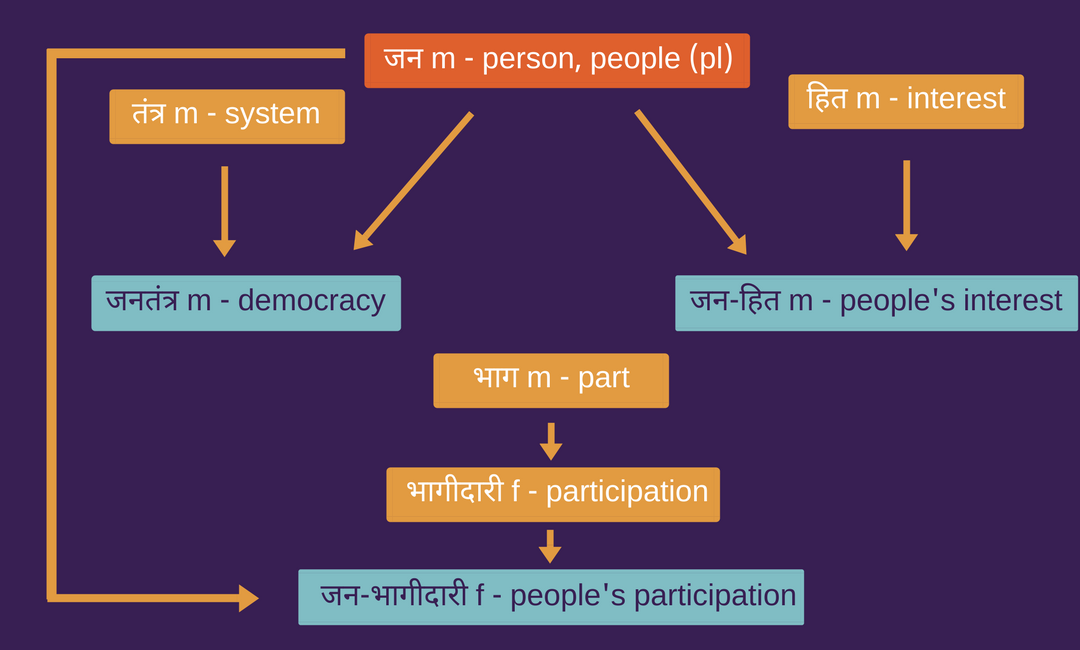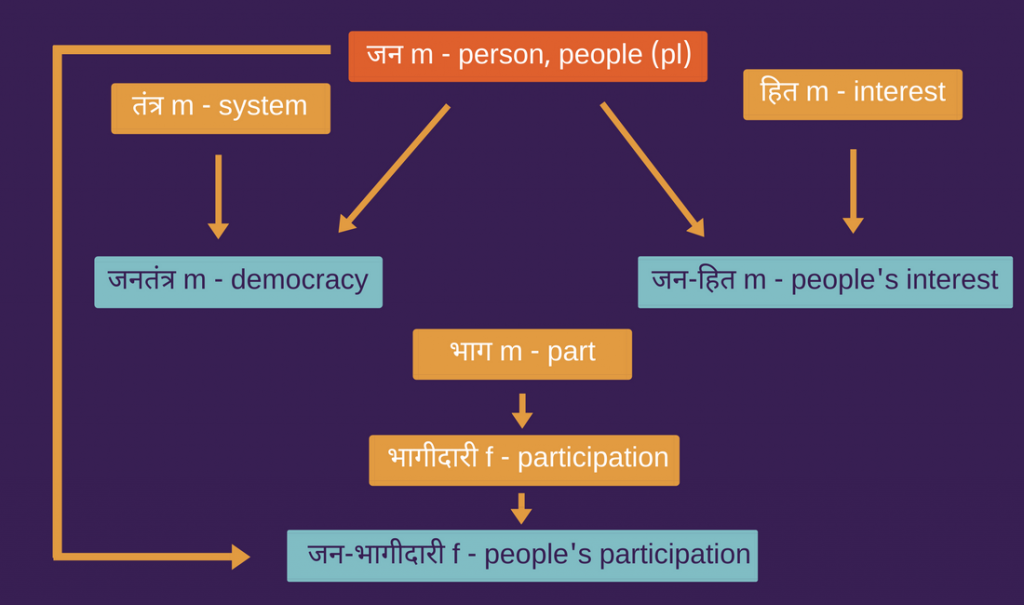The task of learning, memorising, and eventually using new words in a foreign language can be daunting. Compared to the finite number of rules that govern grammar systems with its conjugations and declensions, the number of new words to learn in a foreign language seem to approach infinity.
Using Hindi as an example, this article will present four methods foreign language students can use to acquire a strong vocabulary:
Word Maps
One useful way of memorising new words is learning them in chunks using word maps. Some words maps are built around the definition of a particular word with linked synonyms and antonyms. More generally, word maps are like webs linking words together conceptually. Here is an example of a word map for democracy in Hindi:
Such maps provide a context for identifying and assimilating new words in our vocabulary using the words we already know. Another advantage is that when the time comes to use one or more of these words in speaking or writing, we are often forced to use some of the related words to fully express our intended meaning. So learning such words together actually increases the chance that we will actively use them.
The Etymological Approach
Most classical languages have a well-defined system of nouns, adjectives, and verbs built on a root with the addition of prefixes and suffixes. Suffixation is a very productive way of deriving nouns and adjectives in Latin, Greek, and Sanskrit. Prefixes, meanwhile, tend to add nuance or color to a word root. Arabic, based on the trilateral root system, has a somewhat different way of deriving new forms using a combination of prefixes, infixes and suffixes, which you can read more about in our blog on the topic.
In this section we will present some prefix- and suffix-based derivations from Sanskrit and Persian that are used in Hindi.
Suffixes
The suffix इक in Sanskrit is used to derive abstract adjectives from nouns. Notice the strengthening of the vowel in the first syllable: अ —> आ, इ —> ऐ, उ —> औ
| राजनीति – राजनीतिक
राष्ट्रपति को राजनीतिक दबाव की वजह से इस्तीफ़ा देना पड़ा । |
politics – political
The President had to resign because of political pressure. |
| उद्योग – औद्योगिक
भारत में औद्योगिक विकास तेज़ी से हो रहा है । |
industry – industrial
Industrial development is happening fast in India. |
| परंपरा – पारंपरिक
आज कल के बच्चों को समझने के लिए, पारंपरिक तरीक़े इस्तेमाल नहीं किये जा सकते । |
tradition – traditional
Traditional ways cannot be used to understand today’s children. |
| समाज – सामाजिक
यह हमारी सामाजिक ज़िम्मेदारी है कि हम वातावरण को स्वच्छ रखें । |
society – social
It is our social responsibility to keep the environment clean. |
| इतिहास – ऐतिहासिक
२०११ क्रिकेट विश्व कप में भारत को ऐतिहासिक जीत प्राप्त हुई थी । |
history – historical
In the 2011 cricket world cup India had a historical victory. |
The suffix ई in Sanskrit transforms a noun into an adjective for possessor.
| दुख – दुखी
उसके मरने की ख़बर पाकर, मैं दुखी हो गई । |
sorrow – sad, unhappy
I became sad after I got the news of his death. |
| धन – धनी
अगर मैं धनी होता तो मैं दुनिया घूमता । |
wealth, money – wealthy
If I were rich, I would have travelled the world. |
The suffix मान/वान in Sanskrit also transforms a noun into an adjective that describes possession.
| धन – धनवान
धनवान लोगों को देश के विकास के लिए योगदान करना चाहिए । |
wealth, money – wealthy
The wealthy people should contribute towards nation’s development. |
| बल – बलवान
वह बहुत बलवान है, उसे कोई हरा नहीं सकता । |
strength, power – strong
He is very strong, no one can defeat him. |
| विद्या – विद्वान*
मिश्र जी संस्कृत के बहुत बड़े विद्वान हैं । |
knowledge – scholar
Mr. Mishra is a great scholar of Sanskrit. |
Unlike in Sanskrit, the suffix ई in Persian is used to form abstract nouns from adjectives. All these nouns are feminine in Hindi.
| दोस्त – दोस्ती
राहुल और राना में इतनी गहरी दोस्ती थी कि वे हमेशा साथ रहते थे । |
friend – friendship
Rahul and Rana had such deep friendship that they always stayed together. |
| ख़ुश – ख़ुशी
संगीता की ख़ुशी के लिए ही मैं उसके जन्मदिन पर गया था । |
happy – happiness
I went for Sangeeta’s birthday only to make her happy. |
| ज़िन्दा – ज़िन्दगी*
अपनी खोई हुई बेटी वापस पाकर माँ को एक नई ज़िन्दगी मिली । |
alive – life
The mother got a new life when she found her lost daughter. |
| दीवाना – दीवानगी*
गहरे पानी में कूदने के लिए इंसान में दीवानगी होनी चाहिए । |
crazy – craziness
To jump in the deep water, one should be crazy (craziness should be there). |
* ज़िन्दा and दीवाना end in a short e sound in Persian and so ‘g’ is inserted between a and i.
A parallel usage in Persian consists of a noun followed by दार, which is the present stem of the Persian verb दाश्तन – to posses.
| दुकान – दुकानदार
दुकानदार ने श्याम को कुछ नहीं दिया क्योंकि उसके पास पैसे नहीं थे । |
shop – shop-owner
The shopkeeper did not give anything to Shyam because he did not have any money. |
| ईमान – ईमानदार
देश के विकास के लिए ईमानदार लोगों की ज़रूरत है । |
conscience – conscientious, honest
Honest people are needed for nation’s development. |
Prefixes
While suffixes and infixes help create nouns or adjectives from a root, prefixes in Sanskrit add nuance to the meaning or in some circumstances invert it.
| योग – वियोग
वियोग के बाद भी अनिल अपनी पत्नी से प्यार करता था । |
union – separation
Even after separation, Anil loved his wife. |
वि is usually used in antonyms |
| शिक्षण – प्रशिक्षण
नौकरी से पहले आपको प्रशिक्षण दिया जाएगा । |
teaching – training
Before starting on the job you will be given training. |
प्र adds a sense of coming first or being intense |
| आचार – अत्याचार
महिलाओं पर अत्याचार बंद करो । |
conduct – excessive action/tyranny
Stop the tyranny against women. |
अति is used in the sense of being excessive |
| घटना – दुर्घटना
कल की सड़क दुर्टना में दो लोग मारे गए । |
incident – accident
Two people were killed in yesterday’s road accident. |
दुर् / दुस् means bad or malevolent |
| देश – स्वदेश
भारतीय क्रिकेट टीम अपना दौरा ख़त्म करके स्वदेश लौट आई । |
country – one’s own country
The Indian cricket team returned to their own country today after completing the tour. |
स्व means self |
| मान – अपमान
इतना अपमान सहने के बाद मैं इस घर में और नहीं रहूँगी । |
honour – insult
After tolerating so much of insult I will not live in this house anymore. |
अप means bad or improper |
| मत – बहुमत
सरकार बनाने के लिए पार्टी के पास संसद में बहुमत होना चाहिए । |
vote/opinion – majority
A party needs to have majority in the parliament to form the government. |
बहु means many |
Rarely, prefixes from one source language can be used with words from another source language:
- बहुमंज़िली – multi-storied बहु meaning ‘many’ from Sanskrit and मंज़िल meaning ‘house’ from Persian
बहुमंज़िली इमारत पर काम तेज़ी से चल रहा है । The work on the multi-storied building is progressing fast.
Many words are also derived using a combination of prefixes and suffixes from Sanskrit.
| मुख – बहुमुखी
एक औरत को अपनी ज़िन्दगी में बहुमुखी भूमिका निभानी पड़ती है । |
face – multi-faceted
A woman has to play a multifaceted role in her life. |
| कर्म – सहकर्मी
मैं अपने सहकर्मियों के साथ दोपहर का खाना खाता हूँ । |
work – colleague (सह means ‘co’ or with)
I have lunch with my colleagues. |
There are many more such derivations in Sanskrit and Persian that can enrich a Hindi learner’s vocabulary tremendously. Knowing some of the most common derivations in these languages can help students identify the meaning of new words from its constituents. To delve deeper, check out some of our past blogs about Sanskrit prefixes and suffixes.
Active Reading or Listening
Many times we are able to understand what a text says without knowing the meaning of each and every word. Actively learning in this context means identifying words we don’t know, looking them up in a dictionary and committing them to memory before moving on. The disadvantage of this approach is that it slows the pace considerably and is also hard to implement if the student cannot control the text, like a radio broadcast. In the latter scenario, it helps write down unfamiliar words and look them up later.
Listening or reading actively in this way helps because you not only learn the meaning of a new word, but you also see an example of it being used in a broader context, which is useful in making associations with other words.
In the case of Hindi, this technique is also helpful for learning compound verbs. Whenever you come across a compound verb, try to think of why the speaker used it and what nuance it indicates. As most grammarians will agree, there is no exhaustive set of rules that can tell us what purpose a compound verb is serving in each and every instance and students are expected to eventually grasp the nuances over time through experience and exposure.
Actively Using New Words
Another excellent way to internalize new vocabulary is to commit to actively use it every day. Pick up ten words that you are trying to memorize and use them in throughout the day with your target language speaking friends or acquaintances whenever possible. Or write a short diary entry using those words. Recalling new words in their right context helps to cement them in your memory.
Choose Your Strategy
Each student has his or her own unique learning style and will therefore need to choose an approach or combination of strategies that is most effective. Zabaan’s teachers are trained to use a combination of all four approaches to maximize retention of new vocabulary. Have you used any of these techniques when trying to learn new vocabulary? Which has worked best for you?
Read more by Zabaan:


